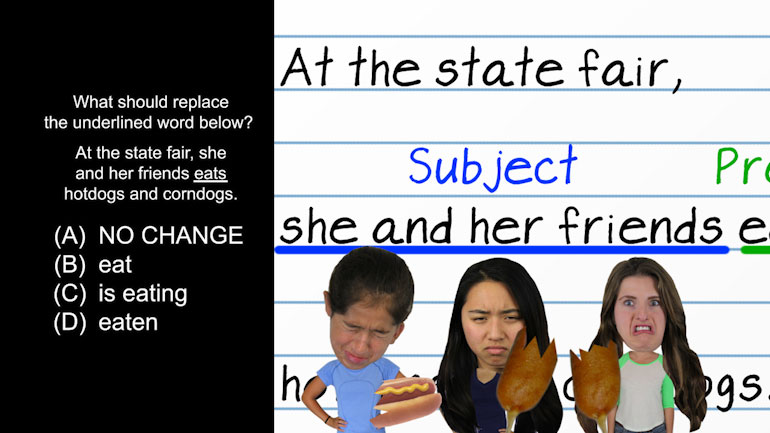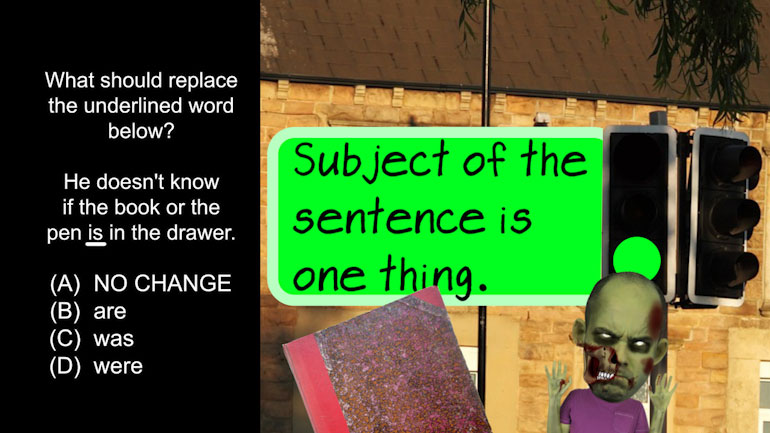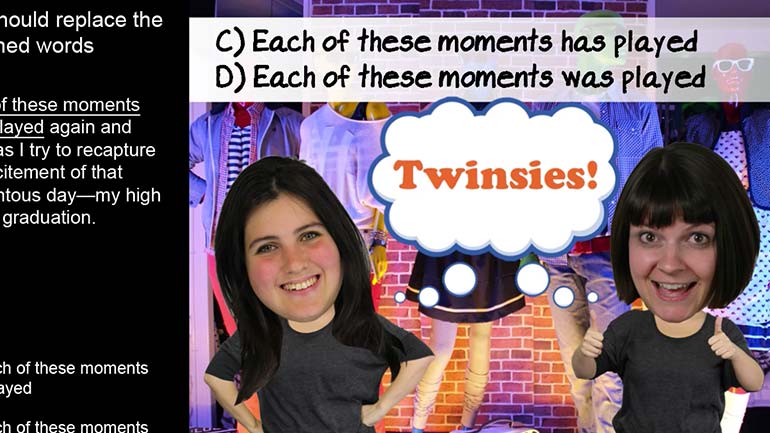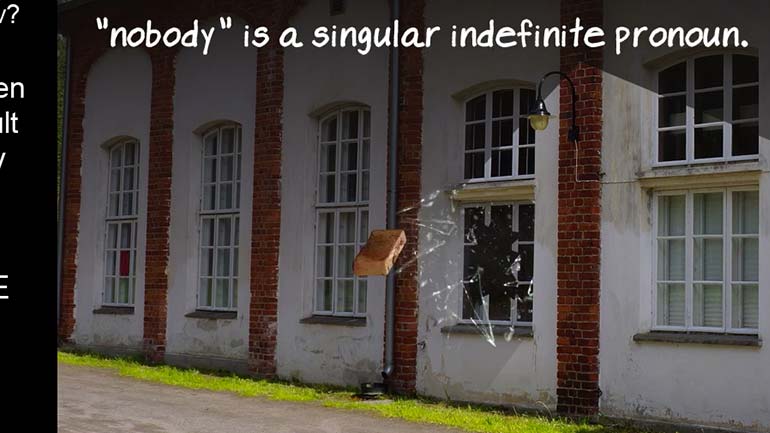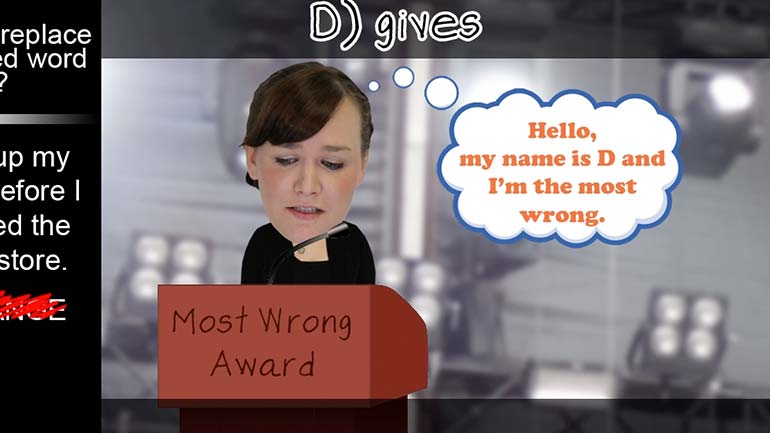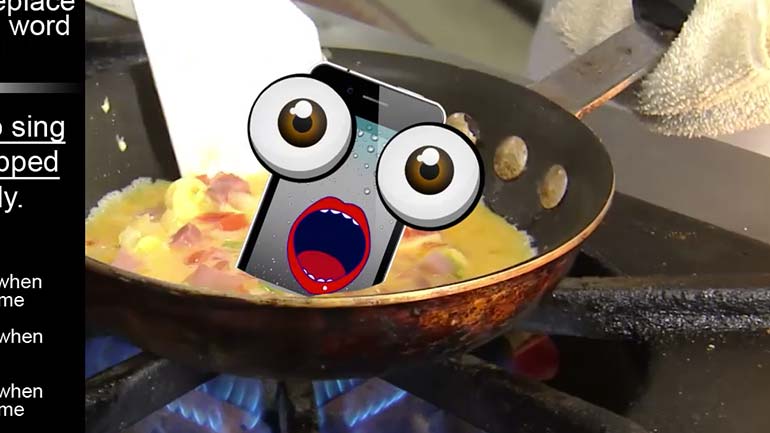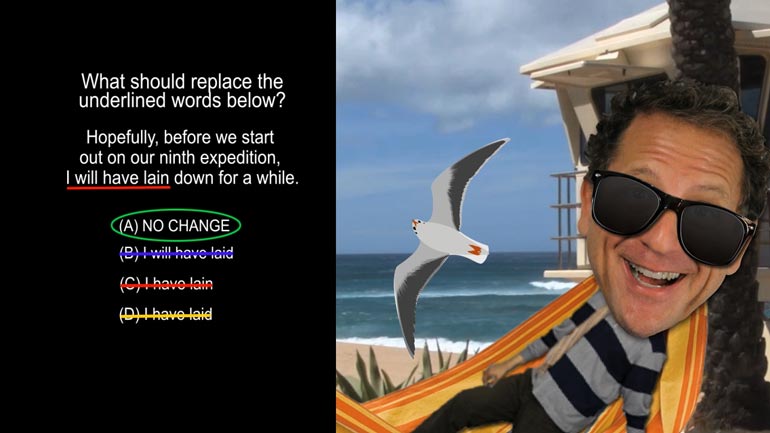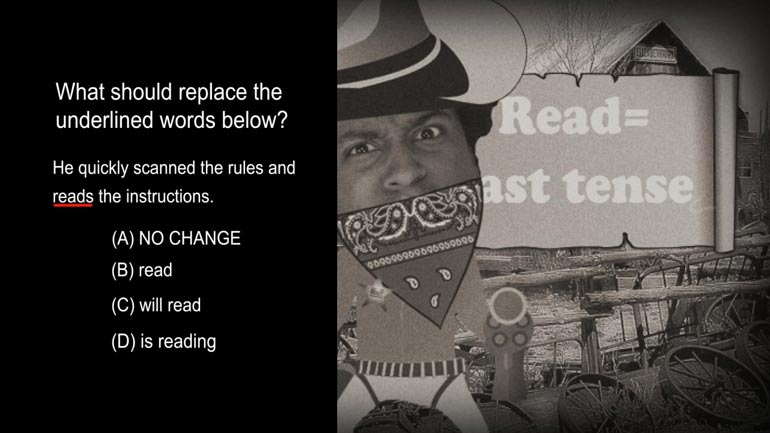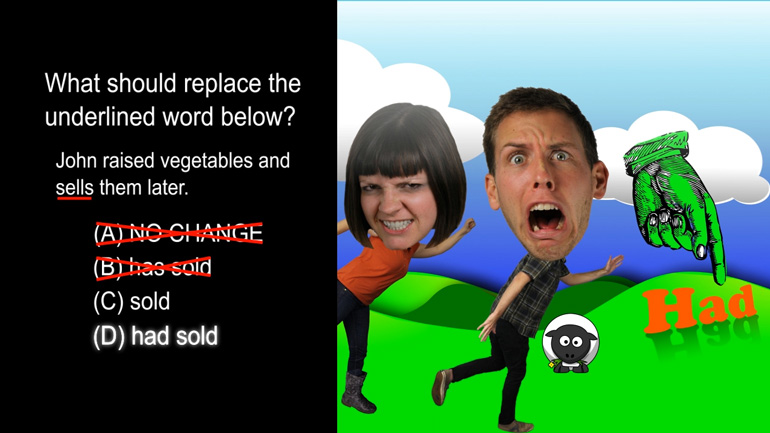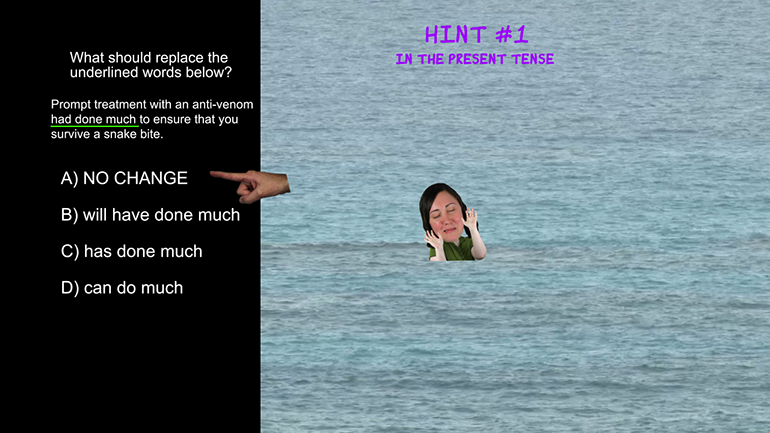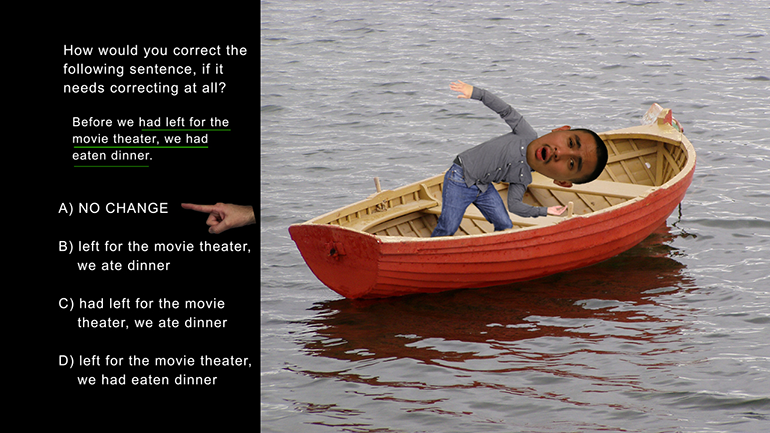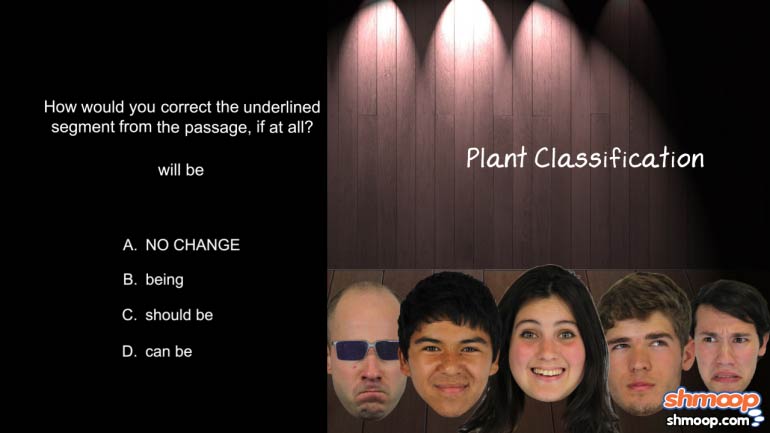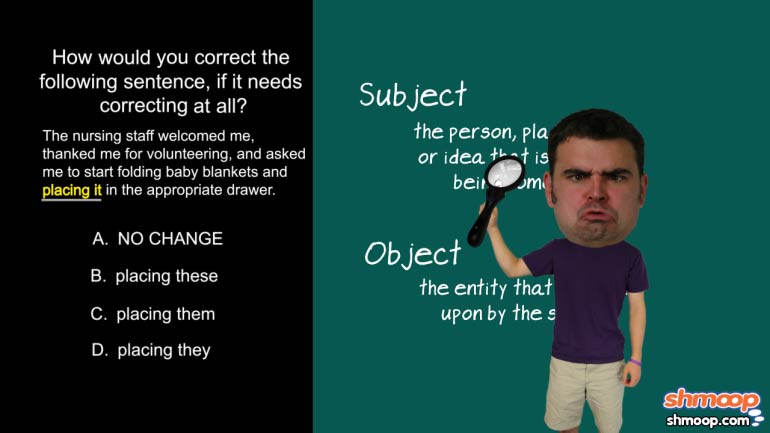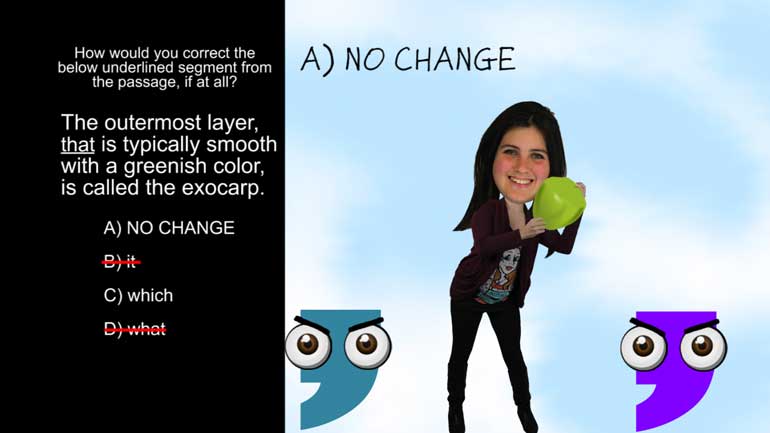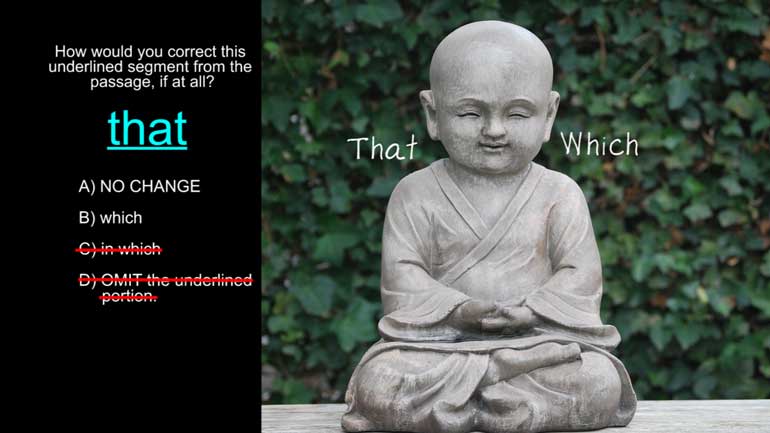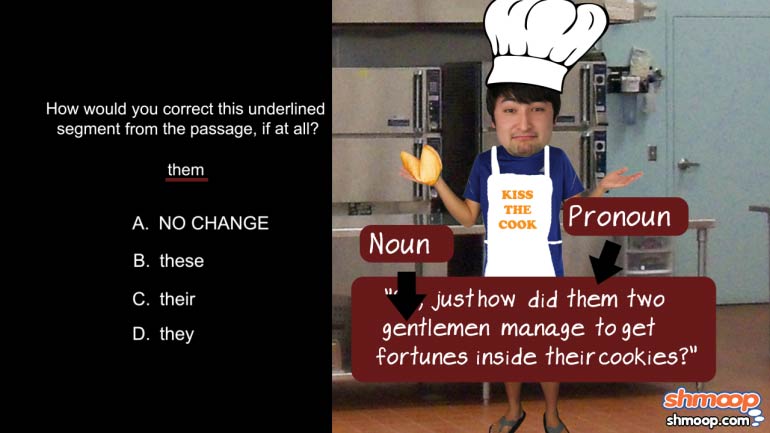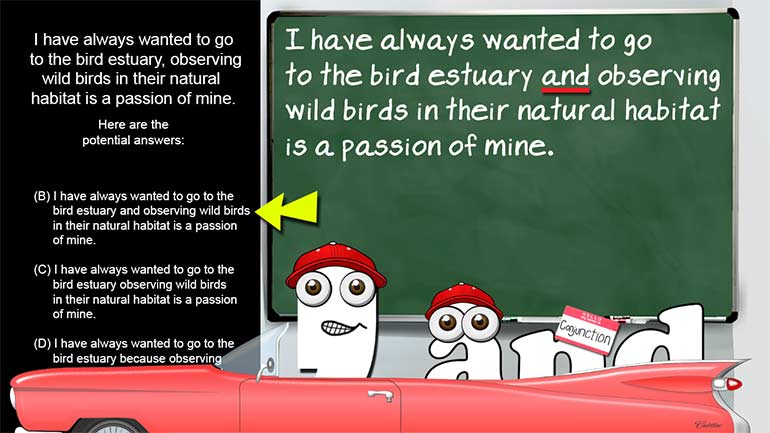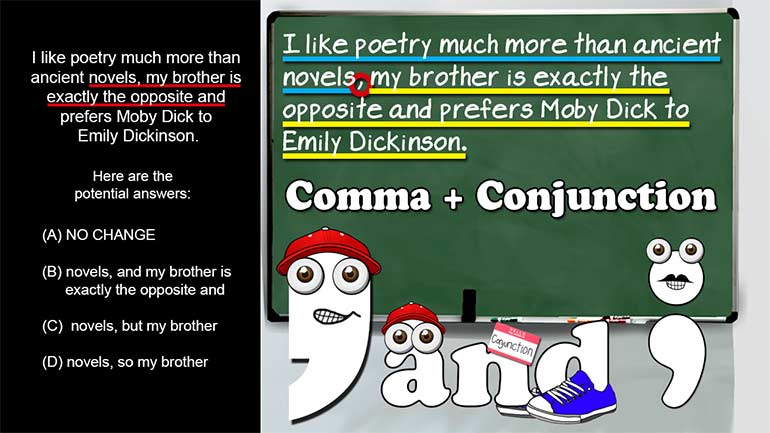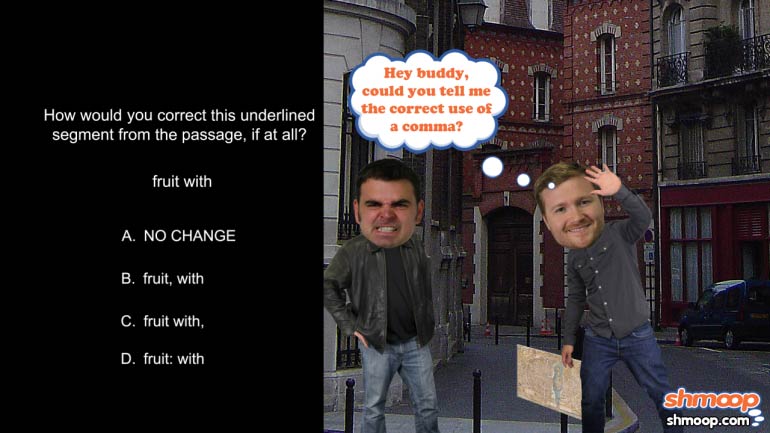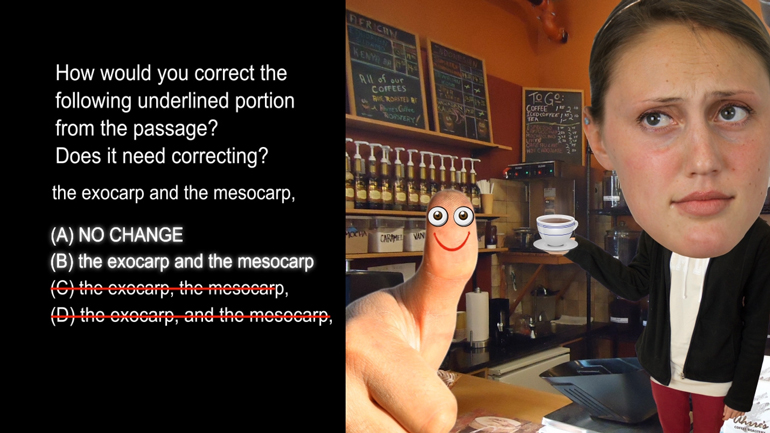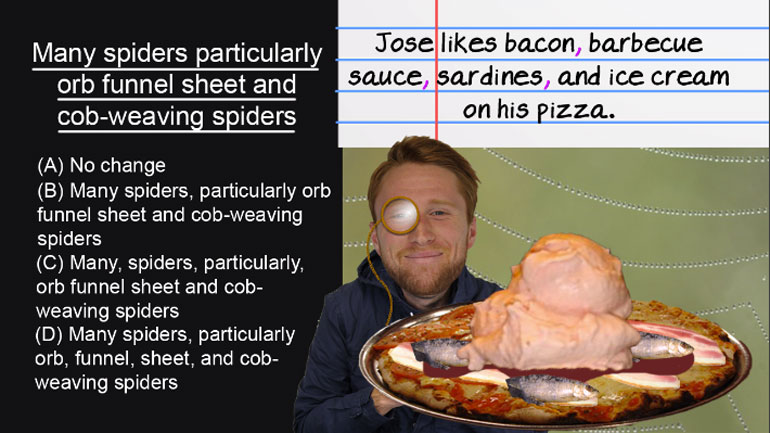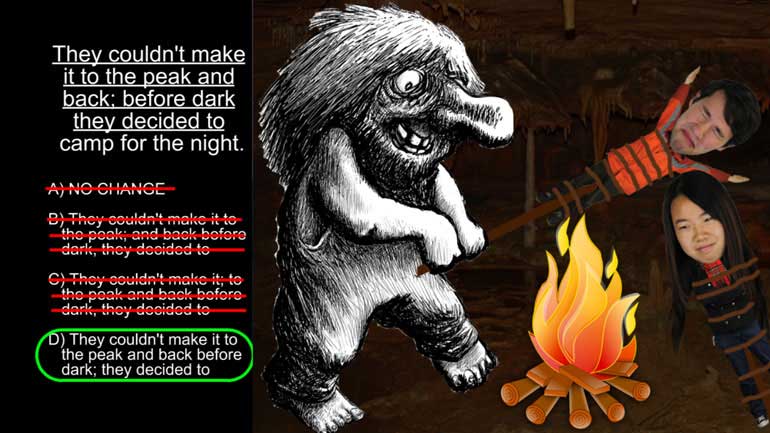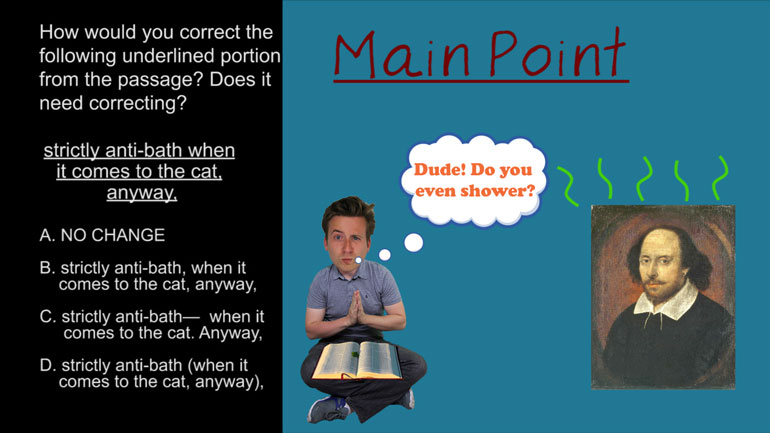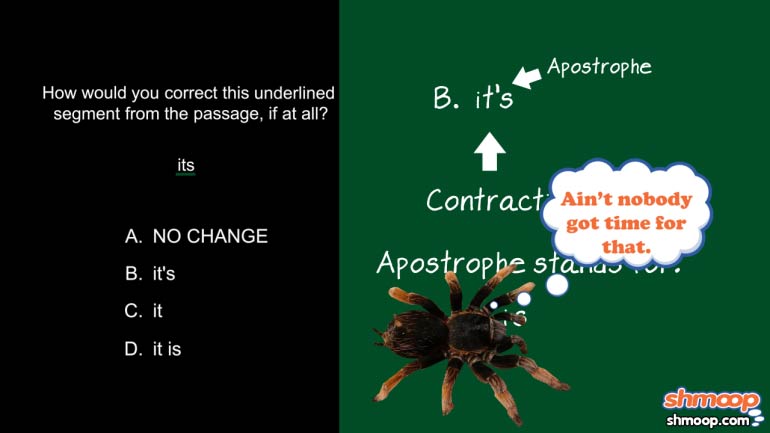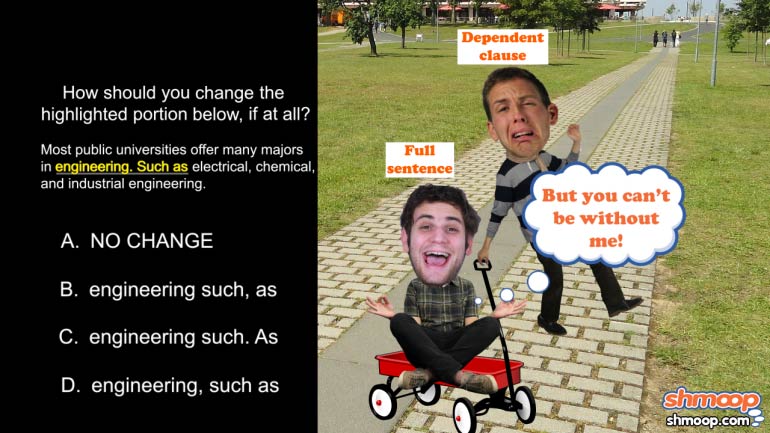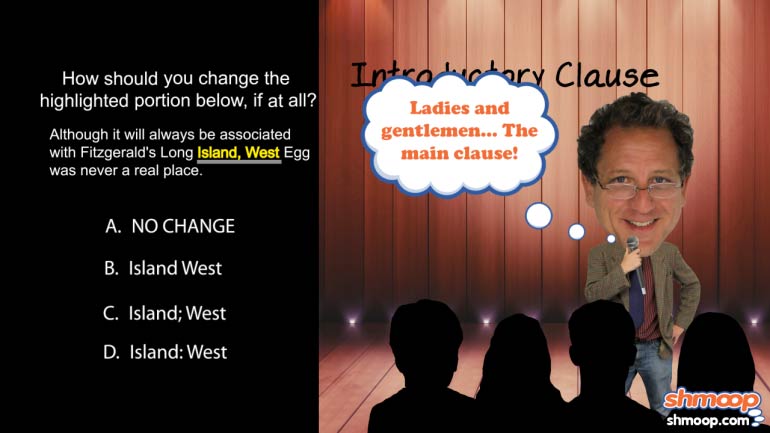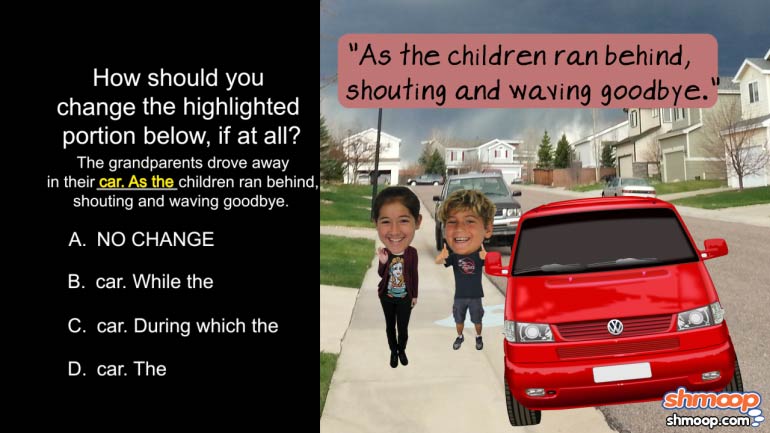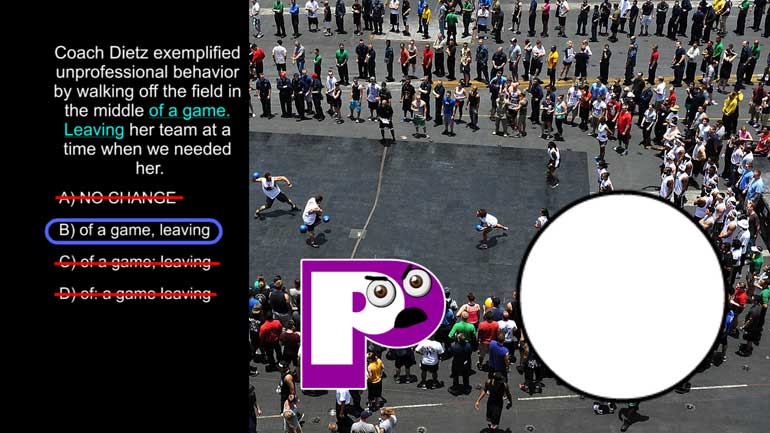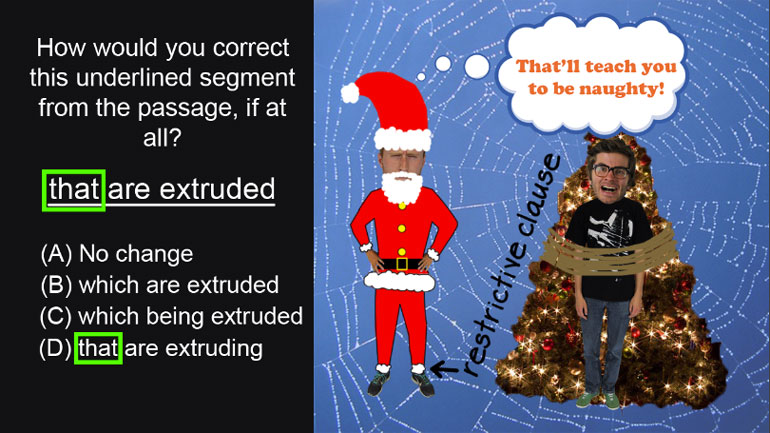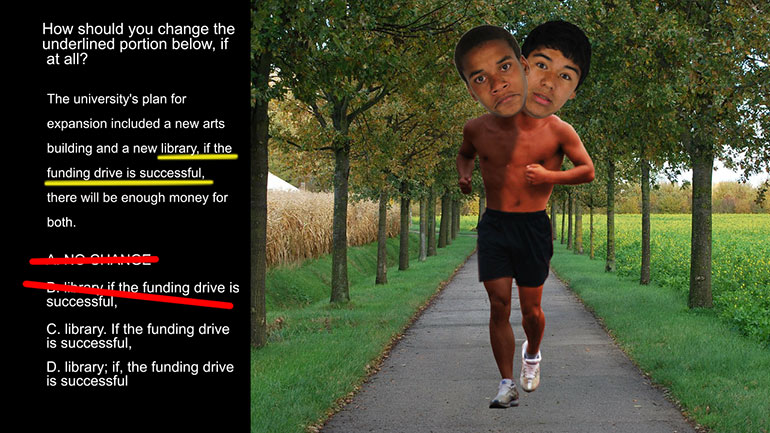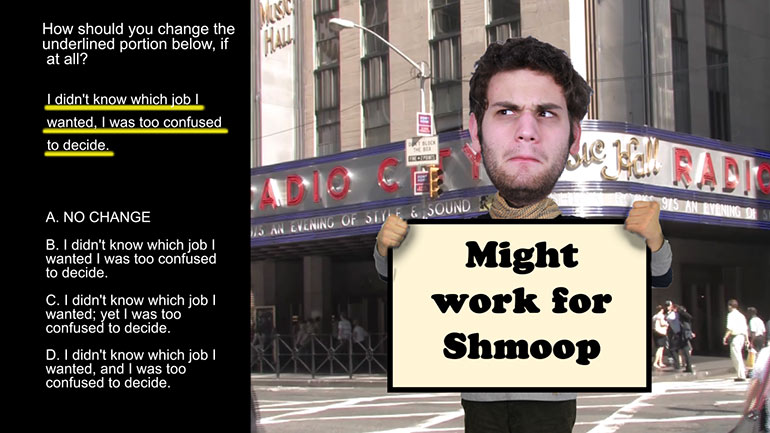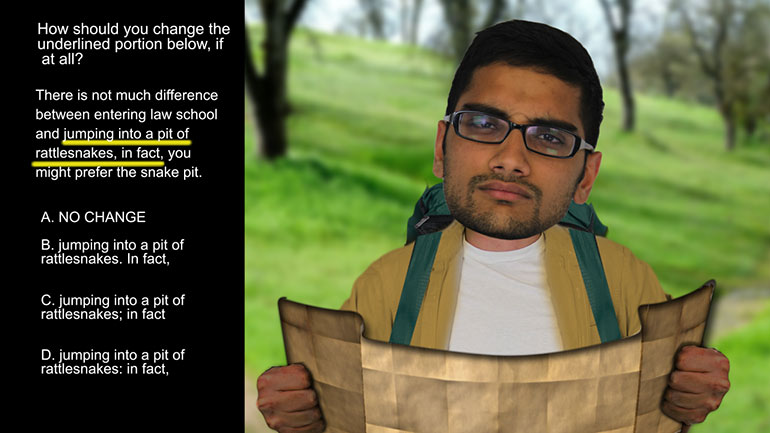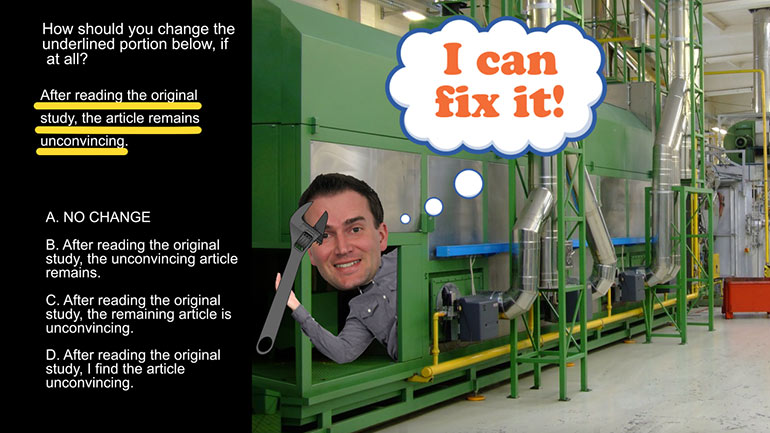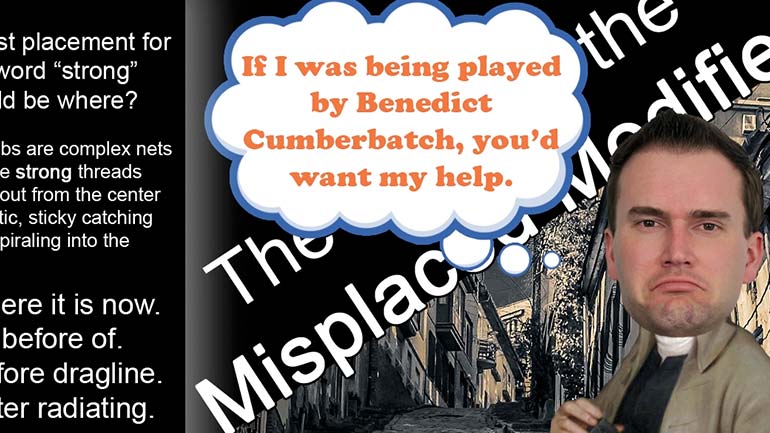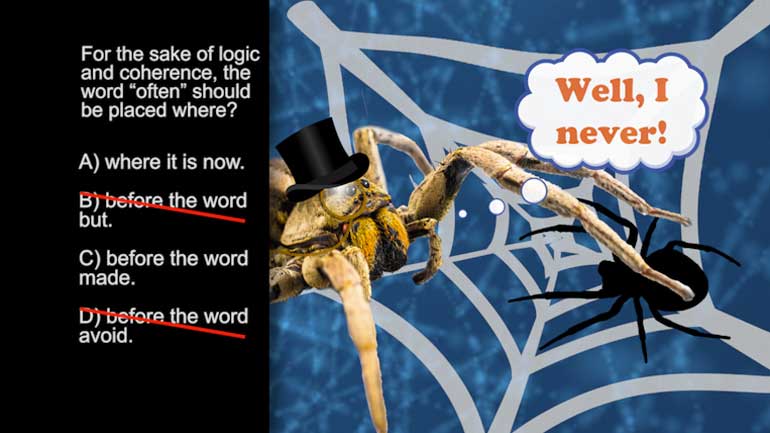ShmoopTube
Where Monty Python meets your 10th grade teacher.
Search Thousands of Shmoop Videos
Usage and Mechanics Videos 116 videos
ELA Drills, Advanced: Punctuation 1. Which option best completes the sentence?
ACT English: Grammar and Usage Drill 1, Problem 1. What should replace the underlined word?
ACT English: Grammar and Usage Drill 1, Problem 2. Does the underlined word match the subject and tense?
Run-on Sentences 6525 Views
Share It!
Description:
Want even more deets on Run-on Sentences? Click here to review. Or take a look at our entire grammar section for all the goods.
Transcript
- 00:04
Run-on sentences, a la Shmoop. Run-on sentences are bad grammar everyone
- 00:09
knows this except apparently for a few authors who think it's okay to throw proper punctuation
- 00:14
out the door in the name of their craft leaving the reader to suffer as he or she struggles
- 00:18
to figure out where one thought ends and the next begins.
- 00:21
Whew. Now that we've survived an encounter with a run-on sentence, let's talk about
Full Transcript
- 00:26
what this particular piece of bad grammar actually...is.
- 00:29
While some people think that run-on sentences are just long...
- 00:32
...like, really, really, really long...
- 00:34
...a run-on sentence actually occurs when sentences are smashed together without the benefit of
- 00:38
any internal punctuation.
- 00:41
Run-on sentences may induce confusion...
- 00:43
...hysteria...
- 00:44
...and even the urge to throw books...
- 00:46
...so use extreme caution when constructing sentences.
- 00:49
The nice thing about run-on sentences is that they are easily fixed, and we have a whole
- 00:52
slew of tools to choose from...
- 00:54
...including colons, coordinating conjunctions, dashes, periods, and semicolons.
- 01:00
So, let's look at some examples of run-on sentences and how to fix 'em.
- 01:06
Say we have the run-on sentence, "William Faulkner is a well-known American author he
- 01:11
lived in Mississippi for most of his life you can visit his house in Oxford and see
- 01:16
where he scribbled all over the bathroom wall."
- 01:20
How can we fix this crime against grammar? Not to mention against poor Mr. Faulkner?
- 01:24
Well, we could deploy several periods, so we end up with...
- 01:27
..."William Faulkner is a well-known American author...period...He lived in Mississippi for
- 01:32
most of his life...period...You can visit his house in Oxford and see where he scribbled
- 01:37
all over the bathroom wall."
- 01:39
Or, we could deploy some periods and a well-placed "who" to get...
- 01:44
..."William Faulkner is a well-known American author who lived in Mississippi for most of
- 01:49
his life...period...You can visit his house in Oxford and see where he scribbled all over
- 01:54
the bathroom wall." Let's look at a different example. "Jim
- 01:58
is a fan of Cormac McCarthy's novels however he had a big problem when he tried to read
- 02:03
The Crossing half of that book is written in Spanish."
- 02:06
Well, let's fix this grammar disaster.
- 02:09
We could do this: "Jim is a big fan of Cormac McCarthy's novels...period...However...comma...
- 02:15
he had a big problem when he tried to read The Crossing...colon...half of that book is
- 02:20
written in Spanish."
- 02:22
Or, we could do this: "Jim is a fan of Cormac McCarthy's novels...comma...although he had
- 02:27
a big problem when he tried to read The Crossing...dash...half of that book is written in Spanish."
- 02:33
Or, we could try door number 3: "Jim is a fan of Cormac McCarthy's novels...period...
- 02:40
However...comma...he had a problem when he tried to read The Crossing because half of
- 02:45
that book is written in Spanish." Run-on sentences can be difficult for the
- 02:49
reader to comprehend.
- 02:50
So, while most of us will never have a really good reason to deploy a run-on sentence...
- 02:54
...this doesn't mean we won't encounter run-on sentences in literature.
- 02:58
For example, take this lengthy entry from James Joyce's novel, Ulysses...
- 03:03
"I was a Flower of the mountain yes when I put the rose in my hair like the Andalusian
- 03:08
girls used or shall I wear a red yes and how he kissed me under the Moorish wall and I
- 03:15
thought well as well him as another and then I asked him with my eyes to ask again yes..."
- 03:21
Let's stop right there. That's fifty-eight words without the benefit of any internal
- 03:27
punctuation, and while that may seem like a lot...
- 03:29
...the truth is that Joyce's sentence actually continues for another fifty-three words. Holy
- 03:35
moly. That gives us a total of one hundred and eleven words, no pauses, no stop until
- 03:41
the very end. While we could never get away with writing
- 03:44
like this...
- 03:44
...because our English teachers would lynch us...
- 03:47
...great authors with lots of critical acclaim and assorted Nobel and Pulitzer Prizes might
- 03:52
decide that a particular story calls for run-on sentences.
- 03:54
So, unless the literary critics start calling us "the next Ernest Hemingway", we need
- 03:59
to stick to proper internal punctuation...
- 04:01
...and avoid run-on sentences.
Related Videos
Want even more deets on wordiness? Click here to review. Or take a look at our entire grammar section for all the goods.
Want even more deets on tenses? Click here to review. Or take a look at our entire grammar section for all the goods.
Want even more deets on semicolons? Click here to review. Or take a look at our entire grammar section for all the goods.
Asking questions can help spice up an essay. Just make sure you don't get too spicy and forget to answer those questions. You don't want to leave y...
This video defines parallel structure and analyzes what makes it powerful (spoiler alert: sticking to a consistent part of speech, like infinitives...

